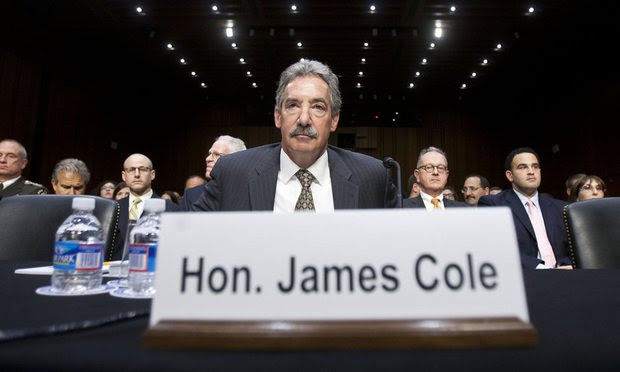Higher Law: Sidley's James Cole Offers His View | ABA Cannabis Webinar: Highlights | Curaleaf Names Compliance Chief | High Times and Harvest Ink Deal
Welcome to Higher Law. On tap: The Cole memo author James Cole, now at Sidley Austin, offers thoughts on marijuana and the law • An ABA panel's views on cannabis and COVID-19 • Curaleaf's new chief compliance officer • Another NYC that may drop marijuana employment testing. Thanks for reading!
April 30, 2020 at 04:00 PM
9 minute read
Welcome back to Higher Law, our weekly briefing on all things cannabis. I'm Cheryl Miller, reporting for Law.com from Sacramento.
This week we're looking at: The Cole memo author's thoughts on marijuana and the law • An ABA panel's views on cannabis and COVID-19 • Curaleaf's new chief compliance officer • Another NYC that may drop marijuana employment testing
Thanks for reading. I always appreciate your feedback, tips and advice for maintaining sanity while working from home. Hey chirpy bird, I'm on deadline here. Drop me a line at [email protected] or call me at 916.448.2935. Follow me on Twitter @capitalaccounts.

Sidley's James Cole Talks Marijuana, Federal Prosecution and Congress
The one-time former top U.S. government lawyer behind the so-called Cole memo still has some thoughts about federal marijuana laws.
James Cole, now a Sidley Austin partner and global co-leader of the firm's white-collar practice, was the U.S. deputy attorney general when he authored guidance in 2013 and 2014 that offered protections from federal prosecution to state-legal marijuana operators. That guidance was rescinded by then-U.S. Attorney General Jeff Sessions in 2018.
But as Cole told Sidley colleague and New York managing partner Samir Gandhi in a recent episode of "The Sidley Podcast," sometimes it doesn't seem like much has changed.
"There's not an overarching policy in the department that's been formally issued, like had been the case from the memo that I wrote, but you're not seeing prosecutions in any large measure different than what you saw when the memo I wrote was in effect," Cole said.
"It is still illegal, but it seems that the discretion of all the prosecutors and U.S. attorneys in the country is that it's not worthwhile for the Justice Department to go after these otherwise state-legal marijuana businesses as long as they're complying with the principles that were in the Cole Memo," he said.
And even after some states declared marijuana outlets "essential" during the pandemic, Cole doesn't think that makes the industry a good investment bet going forward.
"You can invest in a cannabis business if you're willing to take the risk that some federal prosecutor may prosecute you for doing that," Cole said. "At this point, it would be a very confused prosecution, obviously, but it's technically illegal under federal law."
Cole said Congress should, finally, act decisively on marijuana regulation.
"That's the only way we're going to start making any sense out of this and have some sort of regularized business environment," he said. "But if you have your business plan resting on action from the United States Congress, my advice has always been get a new business plan, because that's not always a reliable factor to count on."
>> You can listen to the full interview with James Cole here.
SPONSORED BY ALM
Coronavirus (COVID-19) – Quick Reference Guide
This Coronavirus (COVID-19) reference provides info, tips, and tricks for this global pandemic. Use this quick reference to learn the basics and to understand how to identify the symptoms of the Coronavirus. This printable quick reference is yours to use, distribute, and share at your organization! Along with this free reference card, you will also receive more information from CustomGuide regarding their innovative interactive training and learning solutions to help improve the software skills of you and your staff for success in today's workplace. READ MORE

ABA Panel Talks COVID-19 and Cannabis
The American Bar Association hosted a webinar last week on cannabis and COVID-19 and the irony that marijuana can be deemed essential by some states and illegal by the federal government. Here are a few takeaways.
>> Cannabis companies and ancillary businesses are lobbying furiously for inclusion in Small Business Administration relief. If Congress agrees, "that incremental win would be a huge turning point" in the push for national cannabis regulation, said Kelly Fair, U.S. general counsel for Canopy Growth Corp.
>> Are cannabis-backed municipal bonds an answer for recession-slammed local governments? Sal Barnes, managing director of MPG Consulting, talked about his firm's white paper on cannabis-based municipal bonds, which suggests states and cities could secure funding for major initiatives through cannabis-tax-backed vehicles. Of course, some states already have statutorily or even constitutionally mandated funding targets for cannabis taxes. Barnes noted that the concept works best in new adult-use markets. "New York would have been perfect," according to one of his presentation slides.
>> Andrew Kline, public policy director for the National Cannabis Industry Association, said there's more political momentum right now behind efforts to include state-legal marijuana companies in COVID-19 relief than other industry bills, such as one to expand banking services. "We don't want special treatment," Kline said. "We just want parity. These are requests to be treated like hundreds of thousands of other businesses in the country."

Who Got the Work
>> Former Finra executive James Shorris has been named chief compliance officer at Curaleaf Holdings Inc., Bloomberg Law reports. "Curaleaf Holdings Inc., one of the most valuable U.S. cannabis companies, has hired a new chief compliance officer following the departure of two former top in-house lawyers," the report said.
>> The city of Denver has created a working group to advise leaders on marijuana licensing issues, Westword reports.Group members include Anshul Bagga and Jason Moore of the Denver city attorney's office and Jessica Scardina, senior associate attorney at Vicente Sederberg.
>> Pomerantz has filed a securities class action in the U.S. District Court for California's Central District against PharmaCielo, a cannabis extract company based in Canada, and other defendants. The complaint alleges that PharmaCielo made misstatements or overly optimistic projections about the quality and conditions of its operations.Counsel have not yet appeared for the defendants.

In the Weeds…
>> High Times and Harvest Health reach a deal. Hightimes Holding Corp. will buy 13 active and planned retail dispensaries from Harvest Health and Recreation for $80 million in cash and stock in an agreement announced Tuesday.The Harvest locations will be converted into High Times shops complete with the company's logo and "aesthetic theme." [Yahoo Finance] A Harvest spokesperson told Law.com that internal counsel worked on the deal. Read the news release and purchase agreement.
>> A New York city weighs the use of pre-employment pot testing. Rochester, New York city leaders may stop testing job applicants for marijuana use. "Removal of pre-employment testing for THC avoids unfair discrimination against individuals for an activity conducted during non-work hours that may have no effect on their ability to perform the job for which they are applying," the city's mayor and council president said in a proposal. A city spokesman said such tests have flagged seven applicants for marijuana use among hundreds of tests in recent years. [Democrat & Chronicle]
>> Will a recession spur governments to chase marijuana taxes? "I think the issue is when you've got an enormous hole to fill–and every state will have just a colossal budget deficit–then filling it with a teaspoon of cannabis tax revenue doesn't really feel like the most productive thing you can do," said Roy Bingham, chief executive officer of pot data firm BDS Analytics. Another take: "Every state's going to need every single dollar they can get," said Matt Hawkins, founder and managing partner of private equity firm Entourage Effect Capital LLC. "As a result, once we get on the other side of this, you're going to start seeing a little bit more willingness to discuss, if not pure federal legalization, then quasi-legalization." [Bloomberg]
>> An appeals court sided with Cambridge's "empowerment" pot plans. The Massachusetts Appeals Court overturned a Middlesex Superior Court ruling siding with a medical marijuana company that challenged Cambridge's plan to only allow economic empower applicants to seek adult-use permits for the first two years.The plaintiffs, owners of Revolutionary Clinic, said they hope to have the original injunction reinstated on other grounds. [MassLive]
>> California growers are paying a high price for testing–and failing. A new study by researchers at UC Davis found that tests cost marijuana growers about 10 percent of the average wholesale price, with most of that cost coming from destroying product that doesn't meet California's stringent standards. Failure rates ran around 4 percent in 2019, according to the study. And growers can't just throw bad batches in the compost pile. [UC Davis]

The Calendar: What's Next
May 6 - Business Insurance presents the webinar "The State of the Cannabis Industry in the Wake of COVID-19." Panelists include Wesley Hein, head of legal, compliance and government affairs at Mammoth Distribution and Gary Kaminsky, director of legal compliance at Acreage Holdings. Wilson Elser attorney Dean Rocco moderates.
May 6 - The National Cannabis Industry Association hosts the webinar "Protecting Your Cannabis Brand." Speakers include Dickenson, Peatman & Fogarty partner Christopher Passarelli.
This content has been archived. It is available through our partners, LexisNexis® and Bloomberg Law.
To view this content, please continue to their sites.
Not a Lexis Subscriber?
Subscribe Now
Not a Bloomberg Law Subscriber?
Subscribe Now
NOT FOR REPRINT
© 2025 ALM Global, LLC, All Rights Reserved. Request academic re-use from www.copyright.com. All other uses, submit a request to [email protected]. For more information visit Asset & Logo Licensing.
You Might Like
View All
NY Cannabis Marketing Rulings / Rescheduling Effects / Honigman's Work on Trademark Suit / Goodbye
9 minute read
Workplace Weed and Labor Pacts / State AGs and Hemp / Maryland Licensing Suit / Vicente Sues Recruiter
9 minute readLaw Firms Mentioned
Trending Stories
- 1States Accuse Trump of Thwarting Court's Funding Restoration Order
- 2Microsoft Becomes Latest Tech Company to Face Claims of Stealing Marketing Commissions From Influencers
- 3Coral Gables Attorney Busted for Stalking Lawyer
- 4Trump's DOJ Delays Releasing Jan. 6 FBI Agents List Under Consent Order
- 5Securities Report Says That 2024 Settlements Passed a Total of $5.2B
Who Got The Work
J. Brugh Lower of Gibbons has entered an appearance for industrial equipment supplier Devco Corporation in a pending trademark infringement lawsuit. The suit, accusing the defendant of selling knock-off Graco products, was filed Dec. 18 in New Jersey District Court by Rivkin Radler on behalf of Graco Inc. and Graco Minnesota. The case, assigned to U.S. District Judge Zahid N. Quraishi, is 3:24-cv-11294, Graco Inc. et al v. Devco Corporation.
Who Got The Work
Rebecca Maller-Stein and Kent A. Yalowitz of Arnold & Porter Kaye Scholer have entered their appearances for Hanaco Venture Capital and its executives, Lior Prosor and David Frankel, in a pending securities lawsuit. The action, filed on Dec. 24 in New York Southern District Court by Zell, Aron & Co. on behalf of Goldeneye Advisors, accuses the defendants of negligently and fraudulently managing the plaintiff's $1 million investment. The case, assigned to U.S. District Judge Vernon S. Broderick, is 1:24-cv-09918, Goldeneye Advisors, LLC v. Hanaco Venture Capital, Ltd. et al.
Who Got The Work
Attorneys from A&O Shearman has stepped in as defense counsel for Toronto-Dominion Bank and other defendants in a pending securities class action. The suit, filed Dec. 11 in New York Southern District Court by Bleichmar Fonti & Auld, accuses the defendants of concealing the bank's 'pervasive' deficiencies in regards to its compliance with the Bank Secrecy Act and the quality of its anti-money laundering controls. The case, assigned to U.S. District Judge Arun Subramanian, is 1:24-cv-09445, Gonzalez v. The Toronto-Dominion Bank et al.
Who Got The Work
Crown Castle International, a Pennsylvania company providing shared communications infrastructure, has turned to Luke D. Wolf of Gordon Rees Scully Mansukhani to fend off a pending breach-of-contract lawsuit. The court action, filed Nov. 25 in Michigan Eastern District Court by Hooper Hathaway PC on behalf of The Town Residences LLC, accuses Crown Castle of failing to transfer approximately $30,000 in utility payments from T-Mobile in breach of a roof-top lease and assignment agreement. The case, assigned to U.S. District Judge Susan K. Declercq, is 2:24-cv-13131, The Town Residences LLC v. T-Mobile US, Inc. et al.
Who Got The Work
Wilfred P. Coronato and Daniel M. Schwartz of McCarter & English have stepped in as defense counsel to Electrolux Home Products Inc. in a pending product liability lawsuit. The court action, filed Nov. 26 in New York Eastern District Court by Poulos Lopiccolo PC and Nagel Rice LLP on behalf of David Stern, alleges that the defendant's refrigerators’ drawers and shelving repeatedly break and fall apart within months after purchase. The case, assigned to U.S. District Judge Joan M. Azrack, is 2:24-cv-08204, Stern v. Electrolux Home Products, Inc.
Featured Firms
Law Offices of Gary Martin Hays & Associates, P.C.
(470) 294-1674
Law Offices of Mark E. Salomone
(857) 444-6468
Smith & Hassler
(713) 739-1250










